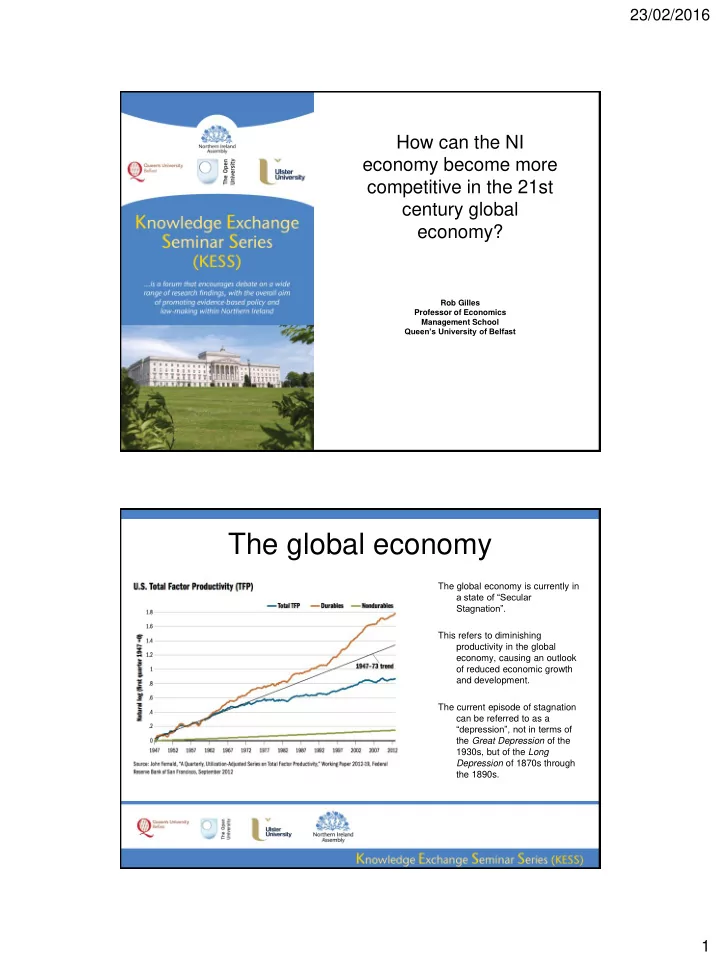

23/02/2016 How can the NI economy become more competitive in the 21st century global economy? Rob Gilles Professor of Economics Management School Queen’s University of Belfast The global economy The global economy is currently in a state of “Secular Stagnation”. This refers to diminishing productivity in the global economy, causing an outlook of reduced economic growth and development. The current episode of stagnation can be referred to as a “depression”, not in terms of the Great Depression of the 1930s, but of the Long Depression of 1870s through the 1890s. 1
23/02/2016 Overview of presentation • What are the causes of this Secular Stagnation? • This is related to how economic wealth is created through a social division of labour. • What economic policies can be devised to increase the generation of economic wealth through a social division of labour? • How can the NI economy get ahead in this era of stagnation? The social division of labour Economic wealth is generated through the interplay of three elements in a social division of labour: • Increasing Returns to Specialisation – Specialising one’s productive activities leads to increased productivity and higher output levels. • Gains from Trade – Specialised producers trade with each other and their customers on the principle that economic wealth is realised through exchange of goods. • Governance – Institutions such as behavioural rules, accepted practices, pricing mechanisms, laws and government regulations govern the trade processes in the networks that make up the social division of labour. 2
23/02/2016 Economic growth In a social division of labour there are two effective ways to increase economic wealth: • Technological development This refers to the increase of output levels if firms adopt innovative technologies and the specialised actors that make up the social division of labour are able to produce more in specialisation. This has been recognised as the main source of growth in economics. Secular stagnation indicates that technological development has become less effective and there are lower returns to adoption of new technologies such as information technologies. • Smithian development This refers to the re-organisation of the social division through the implementation of new intermediary products and goods; new specialisations; and restructured trade infrastructures. This form of development requires strong institutional governance, since the networks in the social division of labour can become more fragile and fail. This was the main direct cause for the financial crisis of 2008. The role of entrepreneurship Entrepreneurs have a critical role in the realisation of Smithian development. • Creating new products; • Introducing new specialisations; • Expanding and re-structuring trade networks; • Contesting existing middleman positions in trade networks; Entrepreneurs can also block and obstruct Smithian development through the strengthening of their middleman position in the prevailing trade networks. 3
23/02/2016 The Northern Ireland economy • The NI economy is marginal in the context of the global social division of labour. • The NI economy has lower growth than the UK and the EU. • The NI labour force ranks at the bottom for basic skills (OECD, 2016). • There have been too much government support for failed entrepreneurship such as DeLorean (Brownlow, 2015). • Can the NI government do better? A strategy for the NI economy The NI government should pursue a strategy composed of multiple components that responds to the requirement to generate Smithian development in the NI social division of labour: • Investment in primary and secondary education to create a well-developed labour force; • Enhance higher education with programmes that support an entrepreneurial spirit founded on advanced knowledge of green energy technologies, sustainable food production, and information technologies. • Support entrepreneurs and start-ups through InvestNI and establish incubation centres for start- ups. • Investigate the institutional framework of the NI economy in which entrepreneurial activities can be supported. 4
23/02/2016 5
Recommend
More recommend